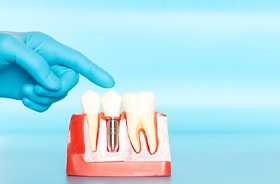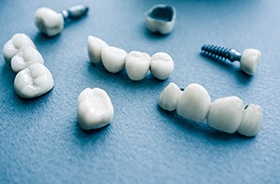
Dental Implants – Woodbridge, CT
Permanent, Secure Tooth Replacement
Your teeth are extremely strong not just because of the enamel, but also because they are rooted in your jawbone, which provides a stable foundation. When a tooth goes missing, most replacement options only bring back the part of the tooth you can see. Unfortunately, this inherently makes them much less sturdy and reliable than natural teeth. Tooth replacement with dental implants in Woodbridge, CT, on the other hand, brings back both the crown and the root, imitating the structure of real teeth as closely as possible. At New Haven Dental Group in Woodbridge, we can fill in any gaps in your smile with dental implants, and unlike other dental offices, we are able to perform every phase of the treatment right here in our office.
Why Choose New Haven Dental Group for Dental Implants?
- Entire Treatment Completed Under One Roof
- Beautifully Replace Any Number of Missing Teeth
- Highly Trained Dental Implant Specialist with 25+ Years of Experience
What Are Dental Implants?

Dental implants are comprised of three main parts: the implant post, abutment, and final restoration. The small dental implant post is inserted directly into the jawbone. These posts are typically made of a biocompatible material called titanium, which is ideal for fusing with living bone tissue. Once a firm foundation has been established, the small connector piece called the abutment is attached on top of it, securing the final restoration into place. This custom-made dental crown, bridge, or denture will be precisely crafted from high-quality materials to blend in seamlessly with the rest of your smile. The end result of rebuilding missing teeth from the roots up like this is a smile that looks, feels, and functions just like natural.
The 4 Step Dental Implant Process

The dental implant process usually takes at least several months from start to finish. Although that may seem like a long time, the end result is worth it! Keep in mind that your journey may not be the same as other patients’. Since each case is unique and there are different types of techniques that we can use, how dental implants work in Woodbridge varies from case to case. During your consultation, we will walk you though what you can expect on the road ahead. In the meantime, we can give you a general overview of what you might expect as our team performs your dental implant services from beginning to end:
Initial Dental Implant Consultation

The dental implant process starts with a free consultation, wherein we will determine whether you are a candidate for dental implants. In order to do so, we will carefully examine your mouth, learn about your overall health, and use imaging equipment to understand your oral structures. Feel free to ask any questions you may have about the procedure or its cost.
In some cases, you will need to complete preliminary procedures, like gum disease therapy or bone grafting, before you qualify for dental implants in Woodbridge. Once your mouth is healthy, we will plan your implant placement surgery.
Dental Implant Surgery

Dental implants have to be surgically placed into the jawbone. Most other dental offices will need to refer you to an expensive outside specialist to complete this step. At New Haven Dental Group, however, we are able to perform the entire implant treatment in-office via our in-house specialists. Thus, you can save time, money, and stress while rebuilding your lost teeth.
The surgery itself is fairly simple. Your implant dentist in Woodbridge will numb your mouth, create an incision in your gums, and carefully insert the implants. After the implants are in place, you can go home and begin recovery. Most patients are feeling well enough to return to work within a day or two.
Dental Implant Osseointegration & Abutment

After the dental implant is in your bone, you will need to go through a healing period of several months so that osseointegration (the process of the bone and implant bonding together) can take place. Osseointegration is the remarkable biological process that enables dental implants to serve as a sturdy base for your restorations.
Following osseointegration, you might need to undergo a second minor surgery. Your implants will be exposed, and healing caps will be placed on them. Later, you will receive abutments. Abutments are small connector pieces that keep implant restorations in place.
Delivery of Dental Implant Restoration

The last step in your dental implant treatment process is the design and placement of the crown, bridge, or denture that will go on top of your dental implants. Using impressions and images of your mouth, we will design your new teeth with the goal of making them as functional and aesthetically pleasing as possible. After a dental laboratory fabricates them, we will attach them to your implants. Then, you can begin to enjoy all the benefits of implant-supported tooth replacement!
Benefits of Dental Implants

Although modern dentistry offers numerous ways to replace missing teeth, most dentists and patients alike regard dental implants as the gold standard of tooth replacement. In fact, more than 5 million implants are placed in the U.S. each year. Why are they so popular? It is because dental implants offer improvements to your quality of life that you simply cannot get with options like dental bridges or dentures. Read on to learn more about why this treatment is so remarkable.
Day-to-Day Benefits

Some of the benefits of dental implants in Woodbridge for everyday life include:
- The ability to eat virtually anything. Because dental implants are anchored in the jawbone, they are extremely sturdy — so sturdy, in fact, that they can allow you to eat almost any food without taking extra precautions. This is in contrast to traditional dentures, which require that you use specific techniques while eating so you do not accidentally destabilize your prosthetic.
- Easy maintenance. Caring for dental implants does not require a lot of time or effort. In fact, in many respects, you can care for them just like you would care for natural teeth. Regular brushing and flossing are of paramount importance. If your prosthetic teeth are removable, you should take them out of your mouth and give them a thorough cleaning each night. You should also visit your implant dentist in Woodbridge for checkups as often as we recommend.
- A beautiful smile. Dental implants are usually dark in color, but they virtually disappear once they are beneath the gumline. The restorations on top of dental implants are carefully designed and crafted to look natural in the mouth. Everything, including their shape, size, and color, is tailored to fit a patient’s unique mouth. The outstanding aesthetics of dental implants may even give you a much-needed confidence boost!
Health Benefits

Dental implants in Woodbridge may benefit both your oral and overall health.
- Jawbone preservation. After tooth loss, the jaw naturally begins to deteriorate; since it is no longer supporting teeth, the body recycles the bone material for other uses. Dental implants can prevent that deterioration, thereby helping your jaw to maintain its original shape.
- Protection for natural teeth. After you lose a tooth, the nearby teeth may begin to drift out of place. Dental implants help to keep every member of your smile where it belongs.
- No need to modify your natural teeth. Placing a traditional bridge requires that the supporting teeth be significantly altered to fit beneath their crowns. Since dental implants are self-supporting, they usually allow a patient’s natural teeth to remain intact.
- Improved overall health. By playing a role in proper nutrition and encouraging you to take steps to prevent gum disease, dental implants can promote your head-to-toe wellness.
Long-Term Benefits

A few of the long-term benefits of dental implants include:
- Most types of tooth replacement, including traditional dentures and fixed bridges, need to be replaced every 5 – 10 years or so. On the other hand, dental implants have the potential to last a lifetime if they receive proper care.
- Save time. Maintaining dental implants requires regular dental checkups, but these checkups are less time-consuming than appointments to get new dentures every few years.
- Enjoy excellent value. Although dental implants have a relatively high upfront cost, their longevity makes them an excellent monetary value. If you calculate their cost per day over the course of a few decades, they are actually quite affordable!
Who Dental Implants Can Help

No matter how many teeth you are missing or where they are located in your mouth, dental implants may be a viable treatment option. During your free dental implant consultation, we will carefully inspect your teeth, gums, and jawbone to see if you are a good candidate. Once you are given the green light (or complete any necessary preliminary treatments) we can discuss how many dental implants and what kind of final restoration you will need depending on the extent of your tooth loss.
Who Is a Good Candidate for Dental Implants?
Most people who have lost one or more teeth can get dental implants, either right away or after some preliminary treatments. Our team wants to help you qualify for dental implants in Woodbridge! Here are a few traits that candidates for the procedure generally have in common:
- Fair overall health. You should be well enough to undergo minor surgery. This means you should be free of any conditions that might seriously compromise your body’s ability to heal, such as unmanaged diabetes or severe illnesses that affect the immune system.
- Good oral health. You must be free of active gum disease before you can receive dental implants. You should also have a good at-home oral hygiene routine because keeping your mouth clean will play a big role in helping your dental implants to stand the test of time.
- Adequate jawbone density. Your jawbone must have sufficient volume and density to integrate well with dental implants.
Missing 1 Tooth
Instead of using a traditional bridge to replace a single missing tooth (which requires us to file down the teeth surrounding the gap), we can place an implant-supported crown directly into the empty space. Thus, we can preserve as much of the remaining dental structure as possible. You can treat an implant-supported crown almost exactly like you would treat your natural teeth.
Missing Multiple Teeth
If you have two missing teeth in a row, you might need just one dental implant to replace both of them. The implant will support a crown and a pontic (artificial tooth). If you are missing three or more teeth in a row, you might need as few as two dental implants to provide the base of support for an implant-supported bridge.
For patients whose missing teeth are not consecutive, multiple single implant crowns or a partial denture might be the best solution. The type of restoration that your dental implant dentist in Woodbridge recommends for you will depend on your unique circumstances.
Missing All Teeth
If you are missing all of your teeth throughout a dental arch, or you will soon need to have your remaining natural teeth extracted, we will probably recommend an implant denture to rebuild your smile. Such a denture can be supported by as few as two or three dental implants, or by as many as six implants or more. It all depends on the type of treatment you choose and the structure of your jawbone. Some implant dentures are removable, whereas others are permanently attached to the implants that support them.
Understanding the Cost of Dental Implants

One of the best parts about dental implants is that they are so versatile; they can be used to replace any number of teeth. Because of this, there is not a set price for the treatment — it varies from patient to patient depending on how many implants are necessary and what kind of restoration is used. Before we begin treatment, we will go over all pricing information with you so there are never any surprises. While implants are certainly a big investment, the many benefits they offer make them worth the cost!
Preliminary Treatments & Dental Implant Surgery

In many cases, patients require one or more preliminary treatments before they can receive dental implants. For example, your implant dentist in Woodbridge might determine that you need gum disease therapy, tooth extractions, or a bone graft. Each of these services incurs its own price.
The dental implant placement surgery has a separate fee. Its cost depends on numerous factors, including the number of implants we place and the amount and type of sedation we use. Since we perform this surgery in-house, you will not have to worry about dealing with the pricing policies of another dental practice.
The Parts of Your Dental Implant

Not all dental implants in Woodbridge are the same. Most are made out of two parts (an implant and an abutment), but some are made out of a single piece. While a titanium-based alloy is the standard material used to construct implants, they may also be made out of zirconia. The type of implant that we use in your case, as well as the company we purchase it from, will affect the overall price of your treatment. If more than one type of implant might work for you, we will clearly explain the advantages and potential risks of each option before you decide how to proceed.
Final Dental Implant Restoration

A dental implant’s job is to replace a tooth root, while a restoration replaces the visible portion of a lost tooth. Restorations come in a number of forms. Logically, a crown that replaces just one tooth costs less than a bridge that replaces three, four, or more teeth. A full-arch denture may cost even more. In some cases, we might be able to help a patient save a bit of money by retrofitting their existing conventional denture to work with dental implants.
Does My Dental Insurance Cover Dental Implants?

It is quickly becoming standard practice for dental insurance to cover implants. However, some policies still do not cover them. You will have to check the specific details of your plan to see how it applies. Our practice welcomes insurance, and we will help you navigate your coverage and file your claims. If your policy does not reduce your out-of-pocket costs for the implants themselves, it might help you with your final restorations or preliminary treatments.
Making Dental Implants Affordable

In addition to assisting you with your insurance, we offer a few resources that may help you to manage the cost of dental implants in Woodbridge:
- The Essential Dental Plan. This membership plan is a wonderful provision for patients without insurance. For a reasonable annual fee, you get to enjoy a number of preventive services for no additional cost, as well as a discount on other treatments, including dental implants.
- Financing. CareCredit is a third-party financier that offers no-interest and low-interest payment plans for medical and dental procedures. The majority of patients qualify for CareCredit.
- Free Consultation. Are you still undecided about whether you want to move ahead with dental implants? You can find out more about the treatment for zero cost. Get in touch with us to schedule your free consultation.
Maintaining & Caring for Your Dental Implants

Your dental implants could provide you with a lifetime of healthy, strong smiles! However, they can only reach that potential if they receive proper care. It is vital that you protect them from damage and infection. Fortunately, minimizing your risk of such problems is fairly simple. Below, we provide some practical tips for dental implant care in Woodbridge.
Make Oral Hygiene a Priority

Even though dental implants cannot get cavities, oral hygiene remains as important as ever. It can greatly reduce your risk of infection around your new teeth. To maintain a clean mouth, you should:
- Brush your teeth twice a day, making sure to clean the area around your gumline.
- Floss once a day.
- Follow oral hygiene instructions that are specific to your restoration. For example, you might need to remove your implant denture in order to clean it.
Eat a Healthy Diet

Dental implants in Woodbridge are extremely durable. In fact, they can enable you to eat almost anything. However, just like some foods are better for natural teeth than others, the same thing is true of dental implants. It is best to limit your intake of hard, sticky, and sugary foods. Instead, stick to a balanced diet that contains a lot of nutrients that support oral health, such as vitamin C, vitamin D, and calcium.
Break Bad Habits

A few habits that can adversely affect dental implants include:
- Tobacco usage. Both smoking and chewing tobacco significantly increase the risk of dental implant failure. Every effort you make to quit will be well worth it!
- Using your teeth as tools. Opening packages or removing clothing tags with your teeth could cause them to break.
- Chewing on hard objects. Biting down on ice, pen caps, or other hard items could damage your restorations or your natural teeth.
Protect Your Dental Implants

If you play sports, it would be wise to invest in a custom mouthguard from your dentist. Not only will it reduce your risk of oral injury, but it can also protect your implants and their restorations. Similarly, if you tend to grind your teeth while you are asleep, a nightguard may be necessary. It will place a barrier between your upper and lower teeth, thus preventing them from incurring premature wear and tear.
Schedule Regular Dental Checkups

You should visit your implant dentist in Woodbridge at least once every six months for a routine checkup. During these appointments, we will thoroughly clean your natural teeth, as well as remove your implant restorations and clean around your abutments. Additionally, we will carefully look for any signs of problems with your implants. If we find any cause for concern, we may be able to address it before it becomes severe and could compromise your implants’ long-term success.
Dental Implant Post-Op Instructions

After your dental implant placement surgery, you will have to go through a recovery period — but there is no need to worry. Below, we will walk you through what you can expect while you are on the mend. We will also provide some practical dental implant post-op instructions in Woodbridge to make your recovery as smooth and comfortable as possible.
What to Do Directly After Dental Implant Surgery

Blood clots should form at your surgical sites. They are a key part of your healing process, so it is important that you do not disturb them. Here are some things you can do to help keep them in place:
- Do not spit. Instead, swallow excess saliva or use tissues to absorb it.
- Do not smoke or use drinking straws. The suction action may dislodge your blood clots.
- Do not touch the surgical sites. It can be tempting to touch your incisions with your tongue or fingers, but doing so is risky.
Common Side Effects

Dental implant patients commonly experience these side effects after their surgery:
- Intermittent bleeding. This may last for several days. Gauze and light pressure can help to keep it under control.
- This may last a few days to a week or longer. Cold compresses are useful for keeping it to a minimum.
- General discomfort. Pain medication, as well as getting plenty of rest, can help to keep you as comfortable as possible.
If you experience any severe or unusual symptoms, call your implant dentist in Woodbridge right away.
Diet

At first, you should stick to a no-chew diet, which can include things like applesauce, pudding, and brothy soups. Later, you can progress to eating fork-tender foods, such as soft breads, meatloaf, and similar items. Once the soft tissue in your mouth is healed, you might be able to resume fairly normal eating habits (if you have enough natural teeth left to help you chew adequately). However, it is wise to continue to be cautious with hard and crunchy foods.
Oral Hygiene

You should continue to brush and floss your teeth as normal, with the exception that you should avoid your surgical sites. Rinsing with warm saltwater a few times a day can help to manage swelling and inflammation. If you have a prescription mouthwash, use it as directed. If you choose to use a nonprescription mouthwash, be sure to avoid those that have a high alcohol content.
What to Do After Your New Teeth Are Attached

Once your new teeth are attached to your dental implants in Woodbridge, you can expect to experience some temporary gum sensitivity, which is usually easy to manage with pain medication. However, you should not have to deal with any swelling or bleeding. Most patients adapt to their new teeth fairly quickly and are delighted to start enjoying the benefits of their new smile.
Dental Implant Failure & Salvage

Dental implants boast an impressive success rate. In fact, more than 95% of cases turn out well. Unfortunately, however, dental implant failure does happen from time to time. It is important that you are alert to its signs and symptoms so you can seek profession help as soon as possible. Our team will strive to identify the cause of the problem and address it with the goal of saving your restored smile.
Dental Implant FAQs
The team at New Haven Dental in Woodbridge is eager to help you enjoy all the benefits of dental implants. However, we understand that the treatment is a big commitment — we expect you to have questions that need to be answered before you move forward. That is why we have put together the following brief list of FAQs. If you do not see the specific information you were hoping for, give us a call. We will be happy to assist you in any way we can.
How Long Do Dental Implants Last?
Research has shown that even 10 years after placement, the vast majority of dental implants are still successful. In fact, with proper care, they have the potential to last a lifetime! Their remarkable longevity is due to the fact that they bond with the jawbone, essentially becoming replacements for the roots of your lost teeth.
Our team will be pleased to help your dental implants in Woodbridge stand the test of time. Visiting us for regular checkups is just one simple thing you can do to take excellent care of them.
Do Dental Implants Feel Natural?
Some soreness and tenderness are normal after your implant placement surgery. Once you get your restorations, you might experience some sensitivity and extra saliva production. However, after you adjust to your new teeth, you can expect them to feel incredibly natural. Their function, form, and appearance are all carefully designed to be as close to that of real teeth as possible.
How Soon After a Tooth Extraction Can I Get Dental Implants?
The answer to this question varies from patient to patient. In many cases, a waiting period of several months is necessary. This allows the jawbone to recover adequately from the extraction before a dental implant is placed in it. In other instances, though, streamlined treatment is a possibility. It might be feasible to extract your tooth and insert a dental implant right away — during the exact same appointment.
If you know you would like to receive dental implants, let your dentist know about your desire before your extractions. They will be able to plan your tooth replacement process in a way that is as efficient as possible.
Do I Need a Bone Graft Before Getting Dental Implants?
A bone graft is necessary when the jawbone is too small or weak to support dental implants. This often occurs due to natural resorption (the body begins to break down the bone after a natural tooth goes missing). Trauma and other factors can also play a role in causing the bone to be inadequate for dental implants. A bone graft builds up the jaw and prepares it to support your new teeth.
Keep in mind that not all patients require a bone graft prior to getting dental implants. Your implant dentist in Woodbridge will carefully examine your mouth and use advanced imaging equipment to understand the state of your jawbone before they design your unique treatment plan.